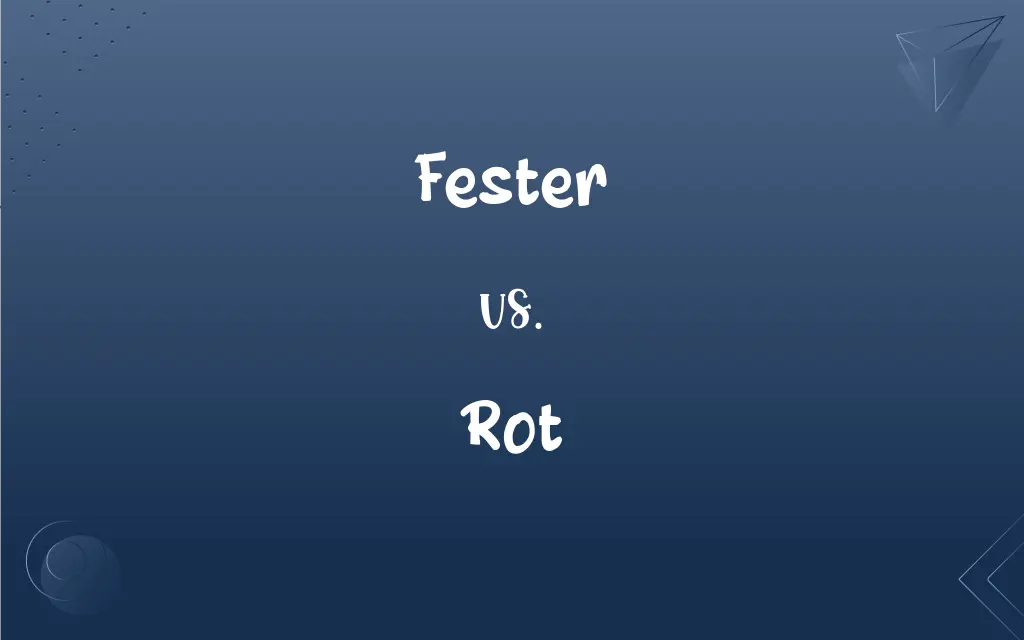Fester vs. Rot: What's the Difference?
Edited by Harlon Moss || By Janet White || Updated on September 28, 2023
Fester refers to the process of decaying or rotting in a way that causes a bad smell, often related to wounds, while rot is the process of decomposing, typically affecting organic matter like food.

Key Differences
"Fester" and "rot" both describe a form of decomposition, but they are utilized in different contexts and convey varying nuances. "Fester" often refers to the worsening of a wound or sore, characterized by the accumulation of pus and resulting in a bad smell. It can also metaphorically describe a negative situation or feeling that worsens over time, symbolizing emotional or moral decay. For instance, unaddressed resentment can fester and deteriorate a relationship, indicating a gradual and harmful process impacting emotional well-being.
On the contrary, "rot" usually refers to the natural process of decay and decomposition, especially in organic matter like food and plants. It is broader in its application and is more associated with physical decomposition accompanied by a foul smell, discoloration, and a change in texture. When food is left unrefrigerated, it begins to rot, signaling the breaking down of its organic components, which is usually visible and tangible.
The term "fester" often implies a condition that needs attention and care. It signifies neglect or lack of intervention leading to the aggravation of a situation or condition. In the context of a wound, if left untreated, it continues to fester, stressing the importance of addressing the issue promptly to prevent further deterioration or infection.
In comparison, "rot" doesn’t inherently imply a need for intervention but is more of an inevitable outcome for organic matter under certain conditions. It is a natural and expected process in the cycle of life and death. A fallen tree, for instance, will inevitably rot over time, becoming part of the soil, emphasizing the unavoidable and impartial nature of decomposition in the environmental cycle.
Comparison Chart
Meaning
Refers to decaying, usually of wounds, causing a bad smell.
Refers to the process of decomposing, typically of organic matter.
ADVERTISEMENT
Context
More specific, often related to wounds or metaphorically to negative emotions or situations.
Broader, related to the decomposition of organic materials.
Implication
Implies neglect and a need for intervention.
Often a natural and expected process without implication of neglect.
Application
Applied to wounds, sores, and metaphorically to emotions or situations.
Applied to organic matter like food and plants.
Metaphorical Use
Can metaphorically represent emotional or moral decay.
Less commonly used metaphorically.
Fester and Rot Definitions
Fester
To become worse or more intense, especially through long-term neglect or indifference.
The unresolved conflict continued to fester within the community.
ADVERTISEMENT
Rot
The process of decaying or spoiling.
The wood was weakened due to rot.
Fester
To cause increasing poisoning, irritation, or bitterness.
His resentment began to fester when his concerns were dismissed.
Rot
A state of decay usually accompanied by an offensive odor.
The vegetable drawer was filled with rot.
Fester
To be in a state of progressive deterioration.
The old, abandoned building was left to fester and crumble.
Rot
To undergo decomposition, especially organic decomposition; decay.
Fester
To generate pus; to become filled with pus.
The wound started to fester due to lack of proper care.
Rot
To become damaged, weakened, or useless because of decay
The beams had rotted away.
Fester
To generate pus; suppurate.
Rot
To disappear or fall by decaying
One could see the blackened areas where the branches had rotted off.
Fester
To form an ulcer.
Rot
To deteriorate through neglect or inactivity; languish or decline
"He upset Alice by calling Washington ... a sink of boredom and saying he was rotting there" (John Dos Passos).
Fester
To undergo decay; rot.
Rot
To decay morally; become degenerate.
Fester
To be or become an increasing source of irritation or poisoning; rankle
Bitterness that festered and grew.
Rot
To cause to decompose or decay.
Fester
To be subject to or exist in a condition of decline
Allowed the once beautiful park to fester.
Rot
The process of rotting or the condition of being rotten
The rot spread quickly, rendering the bridge unsafe even for pedestrians.
Fester
To infect, inflame, or corrupt.
Rot
Foot rot.
Fester
A small festering sore or ulcer; a pustule.
Rot
Any of several plant diseases characterized by the breakdown of tissue and caused by various bacteria, fungi, or oomycetes.
Fester
A fistula.
Rot
Pointless talk; nonsense
She always talks such rot.
Fester
(pathology) A sore or an ulcer of the skin.
Rot
(Archaic) Any of various diseases causing the decay of flesh.
Fester
The condition of something that festers; a festering; a festerment.
Rot
(intransitive) To suffer decomposition due to biological action, especially by fungi or bacteria.
The apple left in the cupboard all that time had started to rot.
Fester
(intransitive) To become septic; to become rotten.
Rot
(intransitive) To decline in function or utility.
Your brain will rot if you spend so much time on the computer, Tony!
Fester
(intransitive) To worsen, especially due to lack of attention.
Deal with the problem immediately; do not let it fester.
Rot
(ambitransitive) To (cause to) deteriorate in any way, as in morals; to corrupt.
Fester
(transitive) To cause to fester or rankle.
Rot
(transitive) To make putrid; to cause to be wholly or partially decomposed by natural processes.
To rot vegetable fiber
Fester
To generate pus; to become imflamed and suppurate; as, a sore or a wound festers.
Wounds immedicableRankle, and fester, and gangrene.
Unkindness may give a wound that shall bleed and smart, but it is treachery that makes it fester.
Hatred . . . festered in the hearts of the children of the soil.
Rot
To spend a long period of time (in an unpleasant place).
To rot in prison
To rot in Hell
Fester
To be inflamed; to grow virulent, or malignant; to grow in intensity; to rankle.
Rot
(transitive) To expose, as flax, to a process of maceration, etc., for the purpose of separating the fiber; to ret.
Fester
To cause to fester or rankle.
For which I burnt in inward, swelt'ring hate,And festered ranking malice in my breast.
Rot
To talk nonsense.
Fester
A small sore which becomes inflamed and discharges corrupt matter; a pustule.
Rot
The process of becoming rotten; putrefaction.
Fester
A festering or rankling.
The fester of the chain their necks.
Rot
Decaying matter.
Fester
A sore that has become inflamed and formed pus
Rot
Any of several diseases in which breakdown of tissue occurs.
Fester
Ripen and generate pus;
Her wounds are festering
Rot
(uncountable) Verbal nonsense.
Fester
To rot or decay, producing a bad smell.
The garbage began to fester in the hot sun.
Rot
To undergo a process common to organic substances by which they lose the cohesion of their parts and pass through certain chemical changes, giving off usually in some stages of the process more or less offensive odors; to become decomposed by a natural process; to putrefy; to decay.
Fixed like a plant on his peculiar spot,To draw nutrition, propagate, and rot.
Rot
Figuratively: To perish slowly; to decay; to die; to become corrupt.
Four of the sufferers were left to rot in irons.
Rot, poor bachelor, in your club.
Rot
To make putrid; to cause to be wholly or partially decomposed by natural processes; as, to rot vegetable fiber.
Rot
To expose, as flax, to a process of maceration, etc., for the purpose of separating the fiber; to ret.
Rot
Process of rotting; decay; putrefaction.
Rot
A disease or decay in fruits, leaves, or wood, supposed to be caused by minute fungi. See Bitter rot, Black rot, etc., below.
Rot
A fatal distemper which attacks sheep and sometimes other animals. It is due to the presence of a parasitic worm in the liver or gall bladder. See 1st Fluke, 2.
His cattle must of rot and murrain die.
Rot
Decay usually accompanied by an offensive odor
Rot
(biology) decaying caused by bacterial or fungal action
Rot
Unacceptable behavior (especially ludicrously false statements)
Rot
Break down;
The bodies decomposed in the heat
Rot
Waste away;
Political prisoners are wasting away in many prisons all over the world
Rot
To become morally corrupt or degenerate.
Dishonest leaders cause societies to rot from within.
FAQs
Can rot represent moral decay?
Yes, rot can metaphorically represent moral corruption or degeneration.
Do fester and rot have the same meaning?
They both involve decay, but fester typically refers to wounds and implies neglect, while rot refers to general organic decomposition.
Can fester be used metaphorically?
Yes, fester can metaphorically represent emotional or moral decay.
Is rot always a natural process?
Rot is typically a natural decomposition process, especially in organic matter.
Can rot be sudden?
Rot is typically a gradual process, but under certain conditions, it can seem to occur relatively quickly.
Does fester always involve a bad smell?
Typically, fester involves decay that produces a bad smell, especially in the context of wounds.
Can rot occur without moisture?
Moisture often accelerates rot, but it can occur in dry conditions, though at a slower pace.
Can festering be reversed?
Festering, especially of wounds, can often be reversed with proper care and treatment.
Can something fester without being infected?
While festering is often associated with infection, metaphorical festering does not involve infection.
Can emotions fester?
Yes, emotions like resentment can fester if not addressed.
Is rot reversible?
Once material has rotted, the process is generally irreversible.
Can rot affect inorganic material?
Rot typically affects organic matter, but similar processes like corrosion can affect inorganic materials.
Is festering more specific than rotting?
Yes, festering is more specific, often related to wounds, while rotting has a broader application to organic matter.
Does rot always produce a foul smell?
Rot typically results in a foul smell due to the decomposition of organic matter.
Does fester imply a gradual process?
Yes, to fester implies a gradual worsening or intensification.
About Author
Written by
Janet WhiteJanet White has been an esteemed writer and blogger for Difference Wiki. Holding a Master's degree in Science and Medical Journalism from the prestigious Boston University, she has consistently demonstrated her expertise and passion for her field. When she's not immersed in her work, Janet relishes her time exercising, delving into a good book, and cherishing moments with friends and family.
Edited by
Harlon MossHarlon is a seasoned quality moderator and accomplished content writer for Difference Wiki. An alumnus of the prestigious University of California, he earned his degree in Computer Science. Leveraging his academic background, Harlon brings a meticulous and informed perspective to his work, ensuring content accuracy and excellence.































































